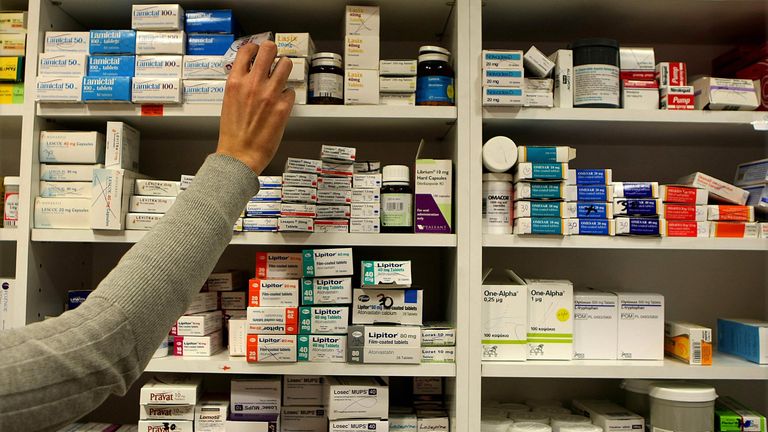Survey Finds Critical Medicine Shortages, Leading to Patients Playing ‘Pharmacy Bingo’
Community Pharmacy England says the problem is an “ongoing battle,” with many businesses concerned it is risking patient health.Survey Finds Critical Medicine Shortages, Leading to Patients Playing ‘Pharmacy Bingo’
People are having to play “pharmacy bingo”—going from shop to shop to find stocks—as medical shortages are worsening, experts have said.
Health leaders have stated that some patients are rationing their drugs. A new poll indicates that drug shortages are a daily occurrence for many English pharmacies.
Treatments for ADHD, diabetes and epilepsy are among those affected this year, according to trade body Community Pharmacy England.
A survey of more than 6,000 pharmacies and 2,000 staff found shortages were “wreaking havoc” on patients.
Nearly all (97%) of staff said patients were being inconvenienced, while 79% said health was being put at risk.
Some 98% said they were also giving out more “I owe yous”—where they can only fulfill part of the prescription.
Nearly all (99%) pharmacies reported supply problems at least weekly, and 72% said they were having “multiple issues a day.”
Growing problems in Europe and the US
Shortages have also been a growing problem in Europe and the US in recent years.
However, the UK leaving EU supply chains is said to have added complications, such as customs checks at borders and drug makers facing extra regulation.
The falling value of the pound after Brexit has also made it more expensive for the NHS to buy medicines.
Community Pharmacy England boss Janet Morrison described the supply problems as “beyond critical.” These issues have become an “ongoing battle” for pharmacies.
She noted that patients with varied clinical and therapeutic requirements are experiencing daily impacts. This goes beyond mere inconvenience, leading instead to frustration, anxiety, and negative effects on their health.
“For some patients, not having access to the medicines they need could lead to very serious consequences, even leaving them needing to visit A&E.”
Ms. Morrison said the survey was “yet another stark warning that must not be ignored.”
Read more:
The girl received medical attention 30 times
Socioeconomic Disparities Lead to Premature Death
William Pett from Healthwatch England called it an “ongoing issue that continues to wreak havoc on patients.”
“Healthwatch England listens to reports of shortages leading to rationing,” he said. “In some cases, this results in ‘pharmacy bingo’, where patients must travel from pharmacy to pharmacy in search of available stock,” he added.
Paul Rees, the head of the National Pharmacy Association, called on the government to address the UK’s vulnerable medical supply system. This would enable pharmacies to effectively carry out their duties and allow patients to receive their essential medicines in a timely manner.
The Department of Health and Social Care has yet to comment.
Community pharmacies closing at a rapid rate, with deprived areas worst affected
Pharmacy First and funding cuts
It’s in this context that NHS England recently said it would invest £645 million into a Pharmacy First scheme, allowing pharmacists to prescribe medicines for seven common conditions, including sinusitis and shingles. The aim is to reduce footfall at GP surgeries, saving a potential 10 million appointments each year.
But Leyla Hannbeck and Reena Barai both believe the funding gap that already exists needs to be addressed before pharmacists can take on new responsibilities.
“The funding is absolutely not fit for purpose,” says Hannbeck. If the government truly values patient care and accessibility to care, they must take pharmacy seriously. This will help prevent people from going to GP surgeries or A&E unnecessarily. We need an immediate cash injection.”
Cuts introduced in 2016
Cuts introduced in 2016 have shrunk the value of the pharmacy contract in real terms.After the cuts were made, there was an accord reached. NUM The value of the contract decreased by £30% from £2.8bn to £2.15bn over a five-year period. The pharmacy contract is now worth 30% less than before.
The parliamentary answer in writing disclosed the figures in January.. They amounted to an annual shortfall of around £67,000 per pharmacy in England.
A report from the National Pharmacy Association, authored by Professor David Taylor of University College London and Dr. Panos Kanavos from the London School of Economics and Political Science, discovered something noteworthy. In England during 2022, community pharmacy held a smaller percentage of total health spending than at any previous time since 1948.
Reena Barai is debating the affordability of joining Pharmacy First.
I strongly desire to participate in Pharmacy First due to my competencies, training, and clinical self-assurance. But to do that, I also need to improve my infrastructure to expand the premises.”
“The government will say, ‘We’ve just announced x million for Pharmacy First’, but that will be to provide a service. We will also have to train our team and make sure we’ve got adequate numbers of staff. We’ll need new IT systems.”


